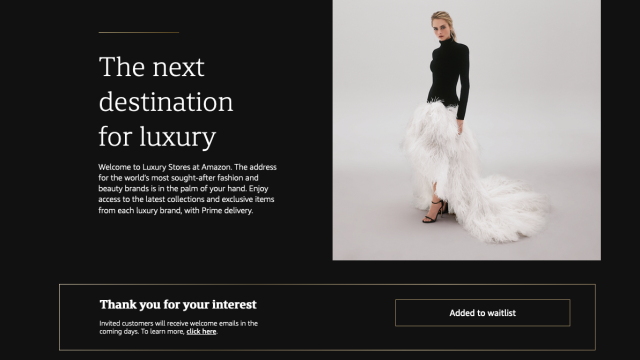In case you haven’t heard, retail is in trouble. Aside from the hundreds of clothing stores that have permanently shuttered after the coronavirus brought shopping to a screeching halt, we’ve also spent the past year watching the slower (though no less tragic) decline of mall staples like Macy’s and JC Penny, not to mention bankruptcies at Forever21 and Neiman Marcus. Meanwhile, consumer surveys are suggesting that there’s a good chance some folks would be alright with never setting foot into a brick-and-mortar store ever again.
It’s against this inarguably shitty backdrop that Amazon rolled out Luxury Stores, which might be one of the most obnoxious enterprises the roughly $2 trillion dollar company has embarked on. The invite-only program is meant to give the 1% access to what the company calls “a ‘store within a store’ experience” inside the Amazon app. Brands can “independently make decisions regarding their inventory, selection, and pricing,” about what they want to display on their Amazon page, and potential customers can peruse their wares via full 360-degree views of every piece of clothing in the highest detail Amazon’s site can muster.
“Enjoy access to the latest collections and exclusive items from each luxury brand, with Prime delivery,” the company describes on its website, which it labels as “the address for the world’s most sought-after fashion and beauty brands is in the palm of your hand.”
Despite being the largest retailer for clothes across the US, Amazon’s struggled to court high-end brands (and their high-end shoppers) for years. Major couture brands like Louis Vuitton and Chanel have turned their respective noses up at the ecommerce giant as far back as 2016, citing concerns about the many, many counterfeits floating across the Amazon ecosystem that the company directly benefits from every day.
Earlier this year, LVMH CEO Bernard Arnault (who oversees the conglomerate housing Louis Vuitton, Fendi, and others) outright said:
“They use their database to connect customers to sellers and they take a percentage, which leads them — and we’re going to try to fight this on their site and on others — to sell counterfeit products.”

Yeah, no thanks. And that’s not even touching on the way generic brands have largely come to dominate the platform over the years and the fact that the Amazon shop format just doesn’t scream “upscale” to the average upscale shopper. That’s probably why the sneak previews of the app-within-an-app that Vogue got its hands on — with its spartan design and gold on white colour scheme — look distinctly unlike the average Amazon pages that we see when drunk shopping for Guy Fieri hoodies (or anything else) on a Saturday night.
Luxury Stores feels like a jubilant victory based on Amazon’s merits and the more it just looks the the result of a perfect pandemic-induced storm. An entire country being locked inside for months on end largely turned to Amazon to get its shopping fix and is now stuck in that company’s web.
Over the company’s past quarter, subscription services skyrocketed, and the company reaped a hefty $US50+ ($68)+ billion in retail sales. If Bezos’s ultimate goal for his company is to make online shopping synonymous with the Amazon brand, he’s doing a pretty good job.
Which is why Vogue’s interview with Alex Bolen — the CEO of luxury retailer Oscar de la Renta, and the first brand partnering in Amazon’s latest venture — is so telling, particularly when Bolen was pressed about the brand’s previous reticence to cosy up to these sorts of partnerships (emphasis ours):
I would guess that somewhere near 100% of our existing customers are on Amazon and a huge percentage of those are Prime members. So they’re already in that environment,” he says. “For me to get more mindshare with existing customers in addition to getting new customers — that’s the name of the game. We want to be able to talk to her wherever she’s comfortable shopping.”
When pressed about luxury’s perceived resistance to the world’s largest online retailer, he adds: “This idea that you don’t want to speak to a customer where she’s spending a lot of her time is a mistake.”
Amazon’s marketplace is a mediocre product. It’s rife with frauds, fake reviews, and shit that can literally get you killed. The people who keep it operating are subjected to inhumane workplace conditions and sometimes die as a result. But ultimately, to Amazon, none of that seems to matter as long as it can maintain this mediocre product’s market power, and in turn, use that same market power to strongarm competitors into playing by Amazon’s unfair rules. In the case of its luxury wing, it looks like Amazon finally managed to get the edge over one of its toughest opponents not only through brute force, but by leveraging a deadly, economy-crushing global pandemic.
